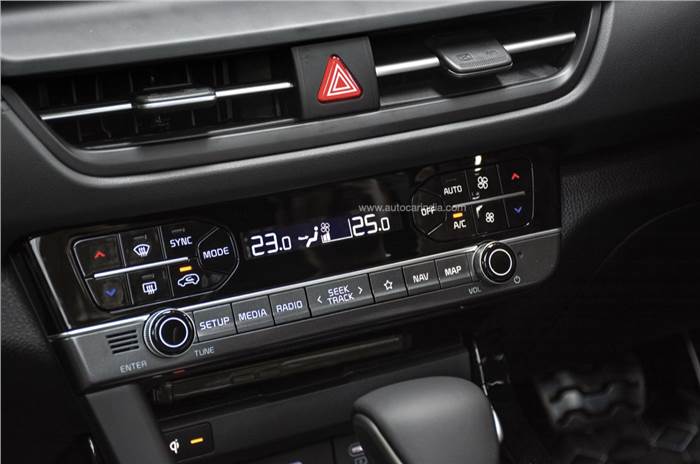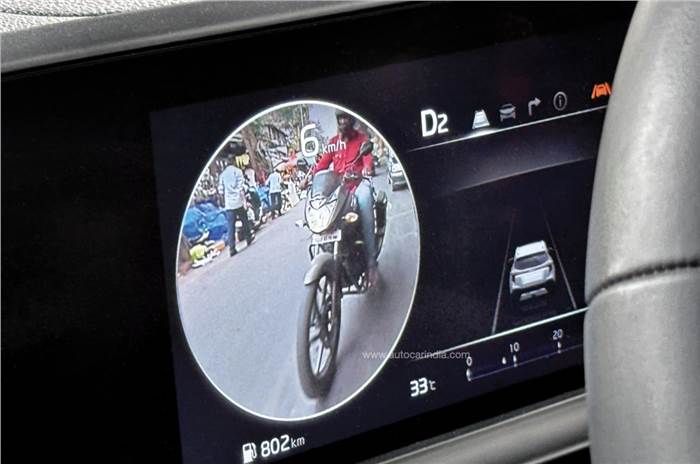Kia Seltos long term review, 5,000 km report
First report: The newly facelifted Seltos joins our fleet with plenty of good looks, an upmarket cabin and an ADAS suite to boot.
Published on Jan 13, 2024 08:00:00 AM
39,534 Views
Follow us on

Parcel shelf rattles noticeably on bumpy roads.
The new Seltos entered our long-term fleet two months ago and almost immediately proved why Kia is a company that punches above its weight. Often seen as the underdog within the Hyundai Motor Group, Kia has aggressively sought to break free from Hyundai’s shadow by putting that little bit extra in its cars, be it with stylish design, cabin quality or tech. It’s simply amazing how much Kia has packed into the facelifted Seltos, which is its bread-and-butter model. We have with us the top-of-the-line GTX+ version equipped with all the bells and whistles, and powered by the 160hp, 1.5 turbo-petrol and a 7-speed DCT.

So what’s it like living with the Seltos? I love how upmarket the cabin feels, the overall quality, the fit and finish, the choice of materials, which makes you feel you’re getting your Rs 19.98 lakh’s (ex-showroom, India) worth. Honestly, compared to the European brands that have dumbed down cabin quality in the Taigun and Kushaq to meet cost targets, there’s no such stinting in the Seltos, which is now the benchmark for feel-good factor.
The all-black interior is a bit gloomy, but splashes of chrome and contrast stitching on the seat do brighten things up. The first thing I do when I get into any car is find a place to put my phone and the Seltos’ wireless charging shelf is nicely located in the centre console.

I love the fact that there are buttons for key functions, and that the buttons and switches have a nice tactile feel to them. You know this is a well-equipped car with a surfeit of buttons that have taken up every possible space on the high-quality steering wheel, including the newly introduced ADAS functions that have become the talking point of many cars in the segment. I’ve activated the autonomous emergency braking (AEB) feature, though I have never experienced it, or rather, haven’t needed to experience it. The point being that the sign of a good emergency braking system is one that only kicks in when a collision is imminent, unlike the hyper-sensitive AEB systems in modern Mercs that tend to interpret minor obstacles as potential threats, which leads to unnecessary and sudden braking interventions that are quite scary.
Playing around with the ADAS menu, I unchecked the lane keep assist, which, in a country where it’s hard to stick to a lane, can be more annoying than useful. Besides, it’s not something that you can really use in the city. A very useful feature, however, on crowded roads is the blind spot camera, or what Kia calls Blind View Monitor, which exposes crazy bikers that could be hidden from the view of the wing mirrors. In fact, on the very first day, I rocked up to the office in our spanking new long-termer and an impatient Activa owner shot out from behind just as I was taking a left into the office gate, nearly grazing the left side wing mirror. Driving in Mumbai, you need as many eyes (or cameras) as possible to stay out of trouble.

For the first few weeks, our Seltos long termer has stayed city-bound and in the thick of the festive season, which always has a surge in traffic. In these stop-and-go conditions, the 1.5 turbo and 7-speed DCT aren’t as happy a pair as the naturally aspirated 1.5 and CVT you get in the lower Seltos variants. Sure, the 1.5 turbo is responsive with light throttle inputs but when you press harder, it doesn’t pull cleanly or seamlessly – the snatchy twin-clutch, which feels like an ‘on-off’ switch at times, not making the drive smoother either. You can see why the 1.5 naturally aspirated and CVT combo is a bigger draw for most Seltos buyers because, apart from being much cheaper, it’s much smoother on city streets. And it’s in the city that car owners spend 90 percent of their time. Early morning drives to the airport revealed the sporty side of the Seltos, which pulls strongly and vigorously once the turbo spools up. Yes, a trip to Mahabaleshwar is long overdue to make the most of the 253Nm of torque via the paddleshifters on the drive up the Wai ghat.

Niggles? The rear parcel shelf has an annoying rattle, which is quite noticeable on bumpy roads, and the fuel efficiency in town isn’t great either, slurping 8.1kpl for the first 5,000km we’ve had it. In the Seltos’ defence, we’ve only used it for short hops in crowded South Mumbai, but we hope to give it a chance to redeem itself on longer drivers. Next stop, Mahabaleshwar!
Also see:
Maruti Suzuki Fronx long term review, 5,000km report
Maruti Suzuki Jimny long term review, 5500km report
| Fact File | Petrol AT |
|---|---|
| Distance covered | 5,000km |
| Price when new | Rs 19.98 lakh |
| Test economy | 8.1kpl |
| Maintenance costs | None |
| Faults | None |
Copyright (c) Autocar India. All rights reserved.






Comments
Member Login
Personal Details
No comments yet. Be the first to comment.